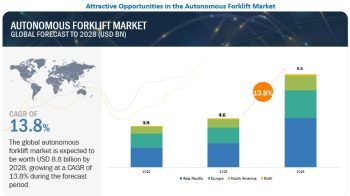The global next-generation sequencing market is projected to reach USD 16.35 billion by 2024 from USD 5.70 billion in 2018, at a CAGR of 19.2%. Factors such as advancements in NGS platforms, declining NGS capital cost coupled with the decreasing cost of sequencing, and improving regulatory & reimbursement scenario for NGS-based diagnostic tests are expected to propel the growth of next-generation sequencing market.
Some of the prominent players in the next-generation sequencing market are Illumina, Inc. (US), Thermo Fisher Scientific, Inc. (US), Pacific Biosciences of California, Inc. (US), BGI (China), PerkinElmer (US), Agilent Technologies (US), QIAGEN N. V. (Germany), Macrogen Inc. (South Korea), Oxford Nanopore Technologies, Ltd. (UK), and Eurofins Scientific (Luxembourg).
Analysis of the developments in the next-generation sequencing market from 2015 to 2018 shows that product launches, product enhancements, and service launches are the most widely adopted growth strategy by players in the market. Players adopted this strategy to strengthen their market positions.
Download PDF Brochure
In 2017, Illumina (US) held the leadership position in the next-generation sequencing market. The company has flagship NGS platforms, such as the iSeq 100 system, NovaSeq 6000, HiSeq Series, MiSeq Series, NextSeq 500, and HiSeq X Ten & HiSeq X Five. The company also provides reagents such as TruSeq sample preparation kits, TruSeq SBS sequencing kits, and other sequencing reagents. It also provides sequencing services such as whole-genome sequencing, human whole-exome sequencing, de novo sequencing, custom-targeted resequencing, gene expression using random-primed RNA sampling, and other related services. The company focuses on further strengthening its position in the market by entering into numerous agreements and partnerships with other small players and launching new products to strengthen its product portfolio in the market. From 2015 to 2018 (July), the company launched more than 15 products and entered into 17 agreements, partnerships, and collaborations.
Thermo Fisher Scientific held the second position in the NGS market. The company’s leading position in the market can be attributed to its strong global presence and well-established supply chain. Thermo Fisher focuses on delivering innovative tools by developing new products to enable healthcare professionals to rationally design, assemble, and order synthetic genetic parts. In the last few years, the company launched a number of products, including the Ion AmpliSeq HD technology, Oncomine Childhood Cancer Research Assay NGS panel, Ion GeneStudio S5 Series NGS instruments, Precision ID GlobalFiler NGS STR Panel v2, and Converge Software 2.


